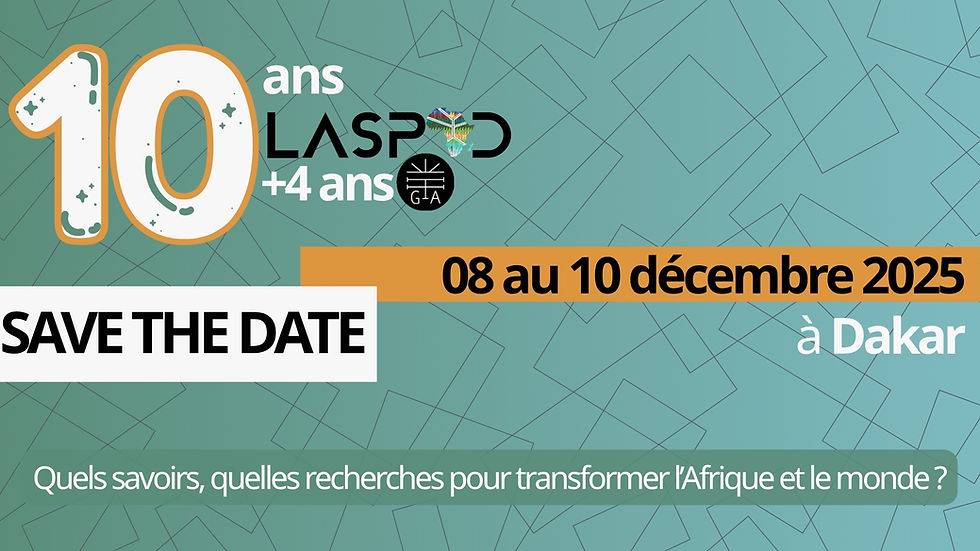Technology and Material Culture in African History
- Jun 13, 2023
- 3 min read
Updated: Oct 11, 2023
Challenges and Potentials for Research . . .
Dar es Salaam, Tanzania

The conference seeks to consolidate and foster the further development of history of technology and material culture in Africa. By gathering scholars from Tanzania and across Africa, as well as colleagues from other continents, the conference will demonstrate the discipline’s high degree of relevance—to the research and teaching of history and adjacent fields, as well as to contemporary political agendas. The organizers wish to use this event to discuss how historians of technology and material culture may contribute to the writing of a “usable past” for further generations.
The organizers invite historians, archaeologists, anthropologists, geographers, sociologists, and urban scholars to discuss the potentials of interdisciplinary and international collaboration around present intellectual, social, technological, and environmental challenges in Africa and globally. In the recent past, African countries have increased citizens’ access to up-to-date mobility and communication technologies—electric household items, mobile phones, and engine-driven vehicles. As the variety of terms indicates—daladala, matatu, tro tros, bodaboda, bajaji, and so on—artifacts are not just simply imported, but constantly modified to fit local circumstances and needs. By and large, however, a historical understanding of these processes of domestication and reinvention is still lacking. That present-day historians of technology do not limit themselves to the study of modern, Western machines and systems, but include broader aspects of (pre-colonial, colonial, and post-colonial) “material culture,” also means the discipline plays a central role both in research projects and teaching programs.
There have been growing initiatives to integrate Africa into the global history of technology and material culture, but such efforts rarely focus on issues of teaching. Considering the ongoing curricular review at African universities, it is a pressing concern to discuss the potentials of including the history of technology and material culture in Bachelor and Masters programs. The organizers are convinced that the discipline of history needs to include an African perspective and showcase Africa’s contribution to global history of technology and material culture. Therefore, the conference focuses on policies, practices, and use to rethink the historiographic role played by material artifacts and systems. We believe there is a certain urgency in researching, writing, and teaching the history of technology and material culture from a truly African perspective. The organizers hope that the workshop will provide important additions to the nationalist and materialist views which have dominated African history research, writing, and teaching since independence.
By giving participants an opportunity to discuss existing research projects and teaching programs, the organizers aim at laying the foundation for an international network of historians of technology and material culture in Africa. We thus ask interested teachers and researchers from Africa and beyond to contribute with standard workshop sessions and papers, roundtable discussions, and further innovative formats. Proposals may be on any thematic area in history of technology and material culture, for example:
The place of technology and material culture in the teaching of African history
The political “usefulness” of technological and material history
Gender and material culture in African history
Craft technologies (e.g., basketry, carpentry, weaving, pottery, metal working).
Farming, fishing, and hunting technologies
The adoption of material objects (e.g., cars, bicycles, electronic and domestic appliances)
Infrastructure histories (e.g., transportation, water, power, sanitation)
Repair and maintenance cultures
Archaeological evidence
Please submit 300-word proposals and one-page CVs to:
Emanuel L. Mchome at emanuellukio@yahoo.com or
Frank Edward at f38edward@yahoo.co.uk
no later than August 31, 2022.
This unique event will be organized by the History Department at University of Dar es Salaam in collaboration with the ERC-funded research project “A Global History of Technology, 1850-2000” at the Technical University of Darmstadt in Germany, the Society for the History of Technology (SHOT), and the Foundation for the History of Technology in the Netherlands. The event will take place on site in Dar es Salaam, Tanzania. Lodging and main meals are provided by the organizers; a one-day excursion is also included. Participants from Africa are invited to apply for travel grants. Selected applicants will be notified Sept. 15, 2022, and they will be requested to submit preliminary conference papers (min. 2,500 words) by Nov. 15, 2022. Representatives of leading scientific journals will be present at the event.
Contact Info:
Professor Mikael Hård
ERC Project “A Global History of Technology, 1850-2000”
Institute of History
Technical University of Darmstadt
Schloss, Marktplatz 15
64283 Darmstadt
Germany







Comments